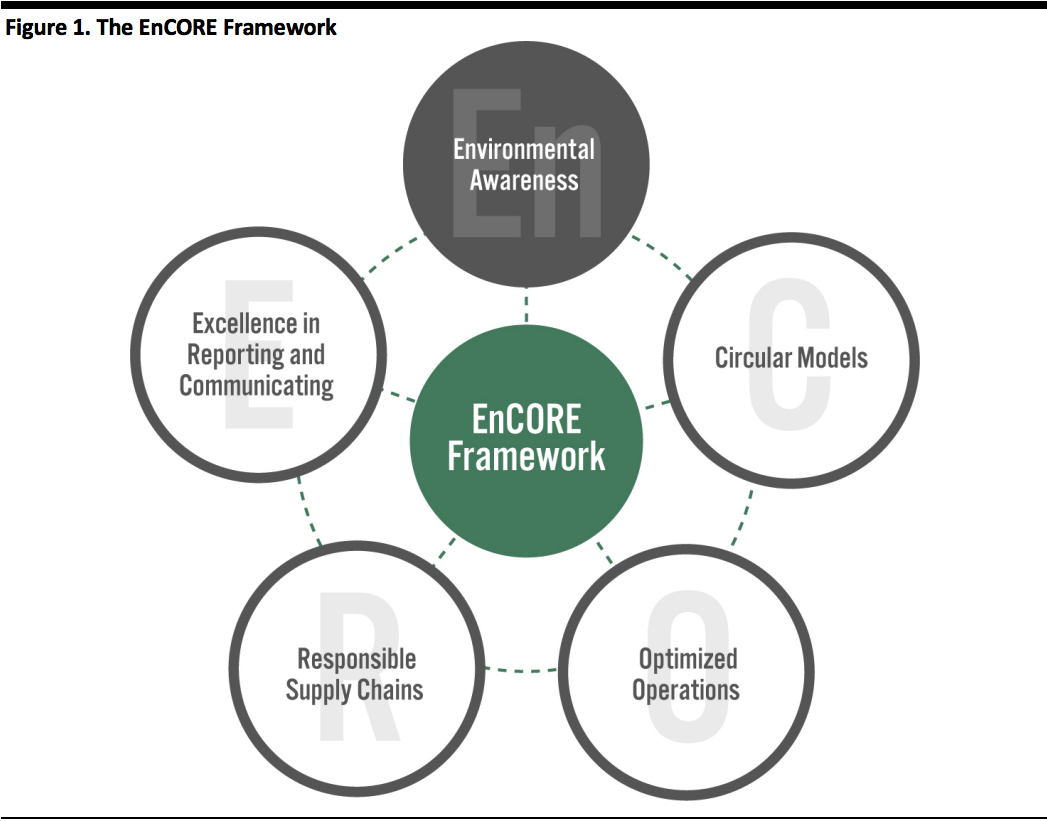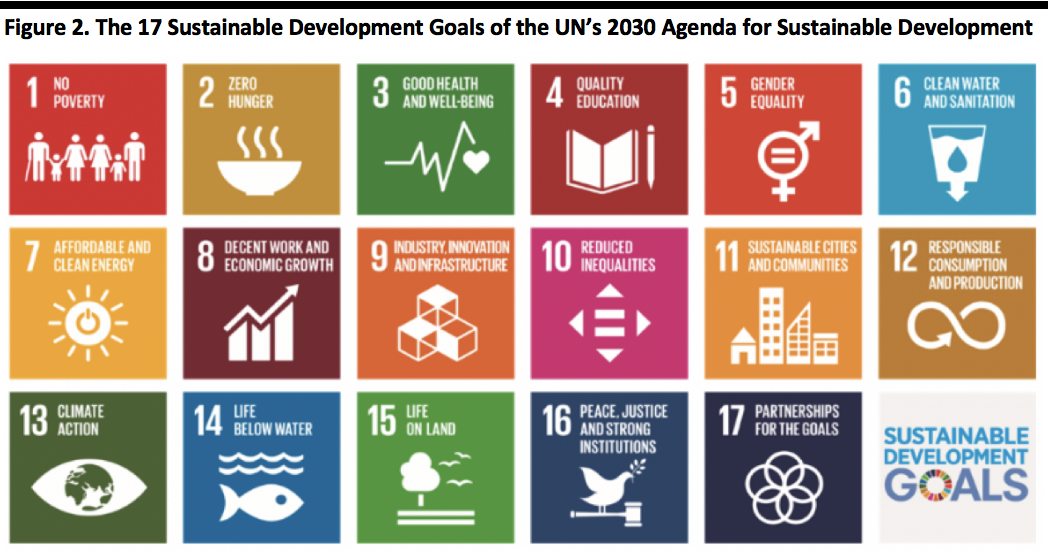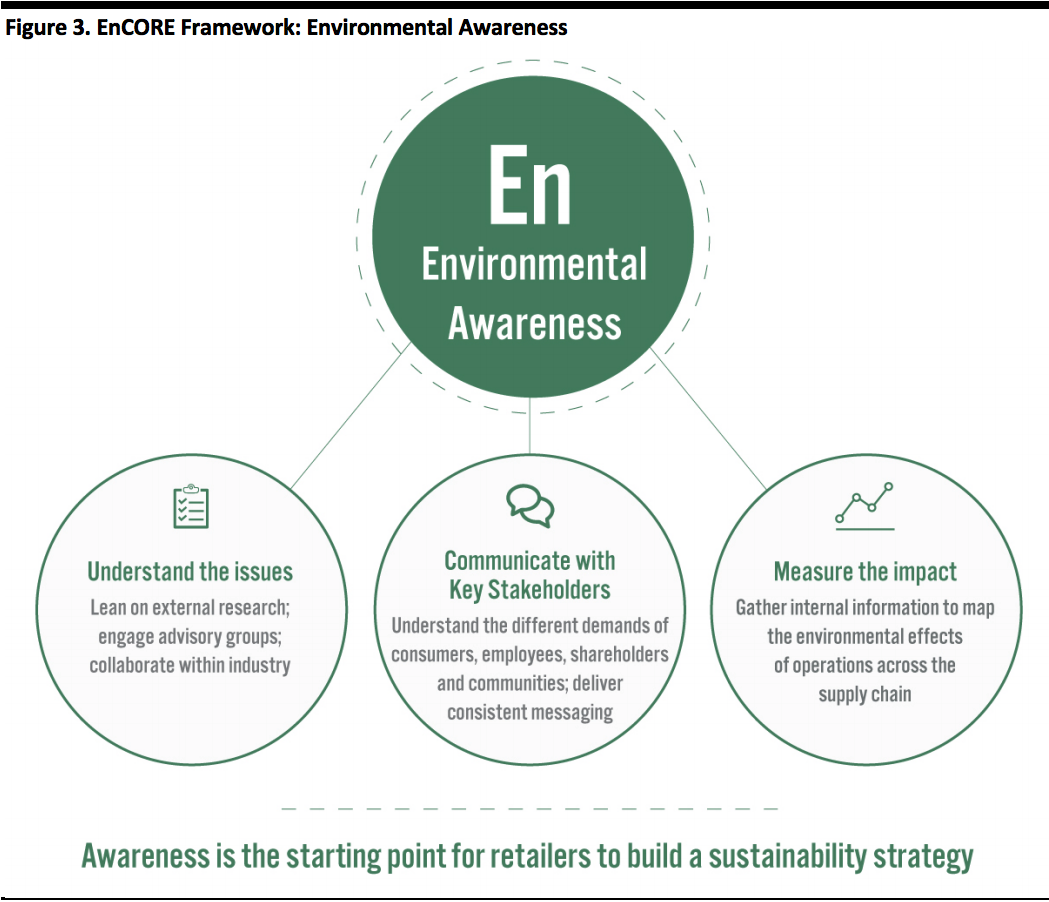
Nitheesh NH
The increased importance of environmental sustainability worldwide is one of five forces that Coresight Research expects to make an impact in retail in 2020. We are seeing heightened global interest in sustainable processes, procedures and products by multiple consumers, employees and investors alike. At the same time, there seems to be a lack of clarity and consistency regarding how retail companies can focus their attention and investments to initiate or strengthen environmental efforts.
Coresight Research has therefore developed its new EnCORE framework to help retailers and brands frame their approach to environmental sustainability. This report is the first in a five-part series that introduces EnCORE. Each report will discuss one of the five components of the framework, providing a model through which retailers can begin to internalize a sustainability strategy. This report introduces the first element—where “En” stands for environmental awareness.
[caption id="attachment_104158" align="aligncenter" width="700"] Source: Coresight Research[/caption]
Source: Coresight Research[/caption]
 Source: UN[/caption]
In addition, the Paris Agreement—adopted by the UN Framework Convention on Climate Change in 2015—aims to strengthen countries’ abilities to deal with the impacts of climate change and reduce the emission of gases that contribute to global warming. It has been signed by 197 countries and ratified by 187. In its special report, entitled “Global Warming of 1.5°C” and published in October 2018, the UN Intergovernmental Panel on Climate Change stated that global emissions must be halved by 2030 and become net-zero by 2050. To demonstrate their efforts in contributing to these goals, 86% of S&P 500 companies published a sustainability report or corporate responsibility disclosure in 2018, up from 20% in 2011 and 72% in 2013, according to the Governance & Accountability Institute.
As outlined in the EnCORE framework and shown in figure 3, we consider there to be three key actions that retailers should take to enhance and demonstrate their environmental awareness throughout the supply chain, from which they can begin to develop a sustainability strategy.
[caption id="attachment_104160" align="aligncenter" width="700"]
Source: UN[/caption]
In addition, the Paris Agreement—adopted by the UN Framework Convention on Climate Change in 2015—aims to strengthen countries’ abilities to deal with the impacts of climate change and reduce the emission of gases that contribute to global warming. It has been signed by 197 countries and ratified by 187. In its special report, entitled “Global Warming of 1.5°C” and published in October 2018, the UN Intergovernmental Panel on Climate Change stated that global emissions must be halved by 2030 and become net-zero by 2050. To demonstrate their efforts in contributing to these goals, 86% of S&P 500 companies published a sustainability report or corporate responsibility disclosure in 2018, up from 20% in 2011 and 72% in 2013, according to the Governance & Accountability Institute.
As outlined in the EnCORE framework and shown in figure 3, we consider there to be three key actions that retailers should take to enhance and demonstrate their environmental awareness throughout the supply chain, from which they can begin to develop a sustainability strategy.
[caption id="attachment_104160" align="aligncenter" width="700"] Source: Coresight Research[/caption]
Understand the Issues
The starting point is knowledge and understanding—including what is happening within the retailer’s own operations and supply chain, as well as externally, in terms of peer standards and incremental industry shifts.
There are four ways in which retailers and brands can take advantage of different sources to bring knowledge, awareness and experience into their organizations:
Source: Coresight Research[/caption]
Understand the Issues
The starting point is knowledge and understanding—including what is happening within the retailer’s own operations and supply chain, as well as externally, in terms of peer standards and incremental industry shifts.
There are four ways in which retailers and brands can take advantage of different sources to bring knowledge, awareness and experience into their organizations:
 Source: Coresight Research[/caption]
Source: Coresight Research[/caption]
Environmental Awareness
Environmental efforts are perhaps the most visible of a retailer’s corporate responsibilities in the way they address the impact of their operations on the planet across the entire supply chain, from component sourcing and water use to pollution and disposal efforts. Environmental awareness is therefore the starting point for retailers in developing a sustainability strategy. Consideration of the environment is being driven on a global scale. For example, the 2030 Agenda for Sustainable Development was adopted by all United Nations (UN) Member States in 2015. It is described by the UN as a “blueprint to achieve a better and more sustainable future for all” and is centered around 17 Sustainable Development Goals (pictured below). [caption id="attachment_104159" align="aligncenter" width="700"] Source: UN[/caption]
In addition, the Paris Agreement—adopted by the UN Framework Convention on Climate Change in 2015—aims to strengthen countries’ abilities to deal with the impacts of climate change and reduce the emission of gases that contribute to global warming. It has been signed by 197 countries and ratified by 187. In its special report, entitled “Global Warming of 1.5°C” and published in October 2018, the UN Intergovernmental Panel on Climate Change stated that global emissions must be halved by 2030 and become net-zero by 2050. To demonstrate their efforts in contributing to these goals, 86% of S&P 500 companies published a sustainability report or corporate responsibility disclosure in 2018, up from 20% in 2011 and 72% in 2013, according to the Governance & Accountability Institute.
As outlined in the EnCORE framework and shown in figure 3, we consider there to be three key actions that retailers should take to enhance and demonstrate their environmental awareness throughout the supply chain, from which they can begin to develop a sustainability strategy.
[caption id="attachment_104160" align="aligncenter" width="700"]
Source: UN[/caption]
In addition, the Paris Agreement—adopted by the UN Framework Convention on Climate Change in 2015—aims to strengthen countries’ abilities to deal with the impacts of climate change and reduce the emission of gases that contribute to global warming. It has been signed by 197 countries and ratified by 187. In its special report, entitled “Global Warming of 1.5°C” and published in October 2018, the UN Intergovernmental Panel on Climate Change stated that global emissions must be halved by 2030 and become net-zero by 2050. To demonstrate their efforts in contributing to these goals, 86% of S&P 500 companies published a sustainability report or corporate responsibility disclosure in 2018, up from 20% in 2011 and 72% in 2013, according to the Governance & Accountability Institute.
As outlined in the EnCORE framework and shown in figure 3, we consider there to be three key actions that retailers should take to enhance and demonstrate their environmental awareness throughout the supply chain, from which they can begin to develop a sustainability strategy.
[caption id="attachment_104160" align="aligncenter" width="700"] Source: Coresight Research[/caption]
Understand the Issues
The starting point is knowledge and understanding—including what is happening within the retailer’s own operations and supply chain, as well as externally, in terms of peer standards and incremental industry shifts.
There are four ways in which retailers and brands can take advantage of different sources to bring knowledge, awareness and experience into their organizations:
Source: Coresight Research[/caption]
Understand the Issues
The starting point is knowledge and understanding—including what is happening within the retailer’s own operations and supply chain, as well as externally, in terms of peer standards and incremental industry shifts.
There are four ways in which retailers and brands can take advantage of different sources to bring knowledge, awareness and experience into their organizations:
- Lean on external research—Retailers can benefit from using external knowledge when changing business processes in order to minimize costs, risks and capacity requirements. They can also draw on third-party information to deepen their understanding of industry priorities and to build awareness of consumer demands. From a strategic perspective, external research informs and validates potential business decisions, thus improving a retailer’s ability to gain some competitive advantage.
- Engage advisory groups or specialist consultants—Sustainability experts can assist with company reviews, providing input, conducting analysis and identifying risks and opportunities for retailers. In addition, external advisors can help retailers to develop sustainability objectives and create an action plan to achieve these, from strategy to delivery. Third-party consultants can also offer insight into how other industries have approached the design and implementation of sustainability models.
- Work with NGOs—Primarily focused on environmental or humanitarian cooperative objectives, NGOs are good models of how to operate with resource constraints. Furthermore, these organizations are highly accountable to their stakeholders when it comes to project management, financial management, performance and corporate responsibility—as are retailers.
- Collaborate within industry—By reviewing other sustainability or corporate responsibility reports, retailers can stay informed on new processes, technology, innovation and implementable solutions. Another advantage is that the costs and risks of bringing in technology that has already been tested and implemented elsewhere are likely to be lower than trying out new technology.